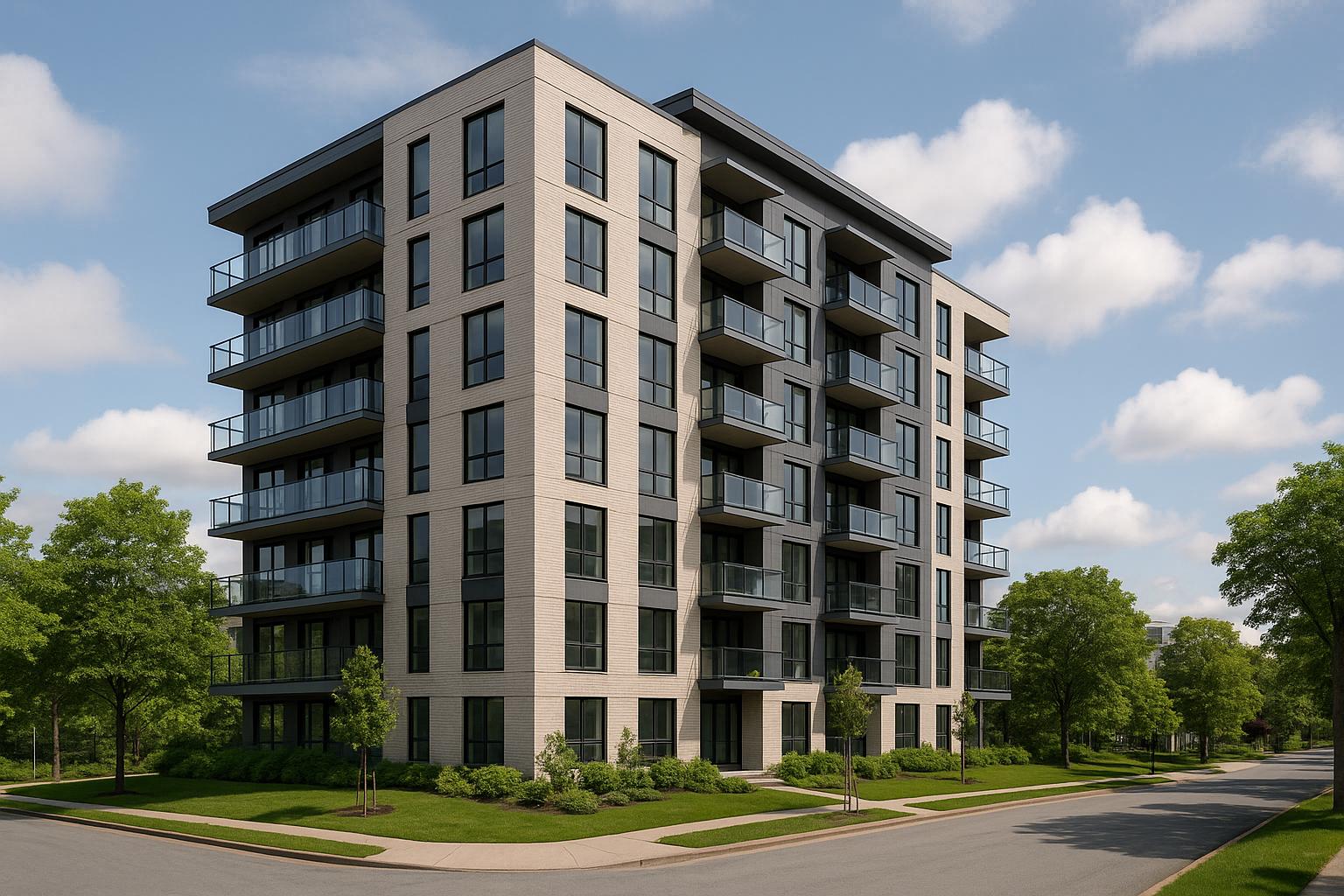Navigating Halifax’s Site Plan Approval (SPA) process can feel overwhelming, but it’s essential for multi-unit residential projects under the Halifax Centre Plan. Without SPA, construction can’t legally begin. This guide simplifies the process, helping you avoid delays, costly errors, and application rejections.
Key Steps for SPA Success:
- Pre-Application: Confirm land ownership, check zoning, and book a consultation with Halifax planning staff.
- Required Documents: Prepare site plans, architectural drawings, engineering servicing plans, and other technical reports.
- Submission & Review: Submit a complete application to avoid delays. Municipal staff and, in some cases, a Design Review Committee will assess your project.
- Public Input & Final Approval: Address public feedback and meet conditions to secure development permits.
Common Pitfalls to Avoid:
- Missing documents or incomplete submissions.
- Poor coordination among professionals (architects, engineers, surveyors).
- Lack of a detailed Construction Management Plan for public-facing projects.
Required Documents and Pre-Application Steps
Pre-Application Requirements
Before diving into your project, you’ll need to confirm land ownership. This means providing a deed, title, or purchase agreement to show you either own the property or have the legal right to develop it.
Next, check that your property's zoning complies with the Centre Plan standards for projects ranging from 4 to 24 units. It’s important to ensure the zoning aligns with permitted uses and development standards.
Book a pre-application meeting with Halifax planning staff. This is your chance to present your project concept and address potential challenges early in the process.
If your property doesn’t have recent drawings, you’ll need an updated site survey. Make sure the survey meets Halifax’s standards to ensure the accuracy of your submitted plans.
Once these steps are completed, you’ll be ready to prepare the technical documents required for your SPA submission.
Required Documents Checklist
To streamline your application, ensure you have the following:
- A site plan prepared by a licensed professional, detailing building placement, parking, landscaping, and stormwater management.
- Architectural drawings, including floor plans, elevations, and building sections, to showcase your design and how it fits within the neighbourhood.
- Servicing plans prepared by a professional engineer, showing connections to municipal water, sewer, and stormwater systems.
- A traffic impact study, if required, to evaluate how your project might affect local transportation.
- Environmental assessments for properties near sensitive areas or those governed by environmental regulations.
- Payment of the application fee, which is based on your development's total value.
Accurate and complete documentation will help speed up the SPA approval process.
Where to Find Official Requirements
To ensure your project meets all the necessary regulations, consult these official resources:
- Visit the Centreplan website for the full details on the Centre Plan and Land Use By-laws [1].
- Check the Halifax Regional Municipality website, specifically the "Regional Centre Plan Area" section, for zoning and development standards [2].
- Refer to the Halifax Municipal Planning Strategy and the Halifax Mainland Land Use By-law for additional planning policies that might apply to your project [3]. Keep in mind that online versions may not always reflect the latest updates, so verify with official sources.
It’s also important to note that the Halifax Peninsula Land Use By-law was repealed by Halifax Regional Council on October 26, 2021, and is no longer in effect as of November 27, 2021 [3].
Finally, review schedule maps to confirm your property’s zoning designation and applicable development rules. Halifax planning staff are available to clarify any uncertainties during your pre-application consultation.
Site Plan Approval Process Steps
Complete Process Checklist
The Site Plan Approval process involves a series of structured steps designed to guide you through your project efficiently while ensuring compliance with Halifax's requirements.
Step 1: Pre-Application Consultation
Kick things off with a consultation meeting with Halifax planning staff. This is your chance to present your project concept and get initial feedback on potential challenges. It’s a helpful way to pinpoint major obstacles early, saving time and money before diving into detailed plans.
Step 2: Plan Preparation and Professional Services
Engage licensed professionals for your project. You'll need a site plan prepared by a qualified professional, building drawings from an architect, and servicing plans developed by an engineer. These experts ensure your plans meet Halifax's technical standards and submission guidelines.
Step 3: Application Submission
Submit a complete application package that includes all required documents, fees, and professionally prepared plans. Incomplete submissions can be sent back for revisions, which may delay your progress.
Step 4: Municipal Staff Review
Once your application is accepted, municipal staff will review it to ensure compliance with zoning regulations, building placement, parking standards, and servicing connections.
Step 5: Design Review Committee Assessment
For projects needing substantive Site Plan Approvals - especially those in downtown areas - the Design Review Committee evaluates the design. They check for neighbourhood compatibility, adherence to urban design guidelines, and may suggest modifications to improve the project.
Step 6: Public Notification and Comment Period
Neighbouring property owners and the public will have an opportunity to review your proposal during this stage. While not every project draws significant public feedback, the input received here can influence final decisions.
Step 7: Final Approval and Conditions
After approval, specific conditions - like landscaping, construction sequencing, or technical requirements - must be met before you can obtain a development permit.
These steps build on the pre-application process, helping you stay organized and on schedule.
Timelines and Who Does What
Clear communication and coordination among everyone involved are critical for a smooth approval process. Halifax has worked hard to improve its approval timelines. In fact, the average time for development application approvals has dropped from 20.8 months in 2022 to just 9.8 months in 2024 - a reduction of about 11 months, making it the largest improvement in the country [5]. Currently, Halifax ranks 13th nationwide for fast development approvals [5].
Roles and Responsibilities:
-
Property Owners:
Ensure you have all required land ownership documents, hire qualified professionals, pay the necessary fees, and respond quickly to any municipal requests. -
Professional Consultants:
- Architects handle your building’s design and ensure it integrates well with the surrounding neighbourhood.
- Engineers focus on servicing connections and other technical elements.
- Surveyors (if needed) confirm property boundaries and topographic details.
Coordinate your team to create a polished and complete submission.
-
Municipal Staff:
They review your application in detail to confirm it meets zoning and design requirements. If needed, they’ll also schedule your project for Design Review Committee meetings.
Starting with a well-prepared and complete application is key to keeping everything on track and avoiding unnecessary delays. Halifax’s streamlined process ensures that projects move forward efficiently when all the pieces are in place.
Common Problems and How to Avoid Them
Why Site Plan Approvals Get Delayed
Delays in Site Plan Approvals can throw off your entire construction schedule and lead to higher costs. Knowing the common issues and how to handle them can save you both time and money.
- Missing or Incomplete Documentation: Submitting incomplete paperwork is one of the biggest culprits behind delays. Municipal staff often return incomplete applications for revisions, which can significantly slow things down. To avoid this, reach out to the Planning and Development department at 902-490-4472 before submitting your application. They can confirm exactly what documents you need for your project[4].
- Poor Coordination and Lack of Pre-Planning: When architects, engineers, and surveyors work in silos, their plans can conflict. For example, an architectural design might not meet engineering requirements, leading to requests for clarification that delay approvals. Skipping the pre-application process can also result in missed zoning or design requirements. If your project is in the Regional Centre, Halifax’s pre-application process offers a review of land use by-laws and design advice, helping you address potential issues early on[4].
- Missing Construction Management Plans: Projects near public areas - such as those within 5 metres of a street or causing potential obstructions - require a detailed Construction Management Plan. This plan should cover your construction schedule, traffic control measures, haul routes, and safety protocols to ensure minimal disruption to the public realm[4].
- Budget Overruns: Traditional construction methods that involve multiple uncoordinated professionals often lead to higher costs. Poor coordination can result in costly change orders and extended timelines, inflating your overall budget.
Avoiding these common pitfalls is key to staying on track with Halifax's expedited timelines. These challenges highlight why traditional construction methods often fall short and emphasize the need for a more unified approach.
Benefits of Integrated Design-Build Approach
An integrated design-build approach can help you tackle these challenges head-on. By unifying all professionals under one accountable team, this method simplifies the process and addresses the common issues that cause delays.
- Single Accountability: With one entity overseeing every phase of the project, decision-making becomes more efficient, and conflicts are minimized.
- Fixed-Price Construction: When design and construction are planned together from the start, teams can establish fixed pricing before breaking ground. This reduces the risk of unexpected costs from design and construction mismatches.
- Guaranteed Timelines: A unified team working on a single schedule helps minimize delays. Some design-build approaches even include financial penalties - up to $1,000 per day - if deadlines aren’t met, giving you more confidence in your project’s timeline.
- Streamlined Approvals: Experienced design-build teams know exactly what municipal staff require. Their well-coordinated submissions often address potential concerns upfront, making the review process smoother and faster.
- Quality Assurance: When the same team handles both design and construction, there’s less room for errors. This close collaboration ensures that the final build matches the original design intent.
sbb-itb-16b8a48
Resources and Professional Support
Official Municipal Resources
If you're navigating the Site Plan Approval (SPA) process in Halifax, the Halifax Regional Municipality offers several resources to make the journey smoother. The Planning and Development department is your go-to contact for questions about documentation or application procedures. You can reach them directly at 902-490-4472.
Their website is packed with valuable tools, including forms, guidelines, fee schedules, zoning maps, and development standards. These resources provide clarity on what’s needed before you even begin your application.
For those tackling Regional Centre projects, the municipality offers a pre-application consultation service. This service, costing between $500 and $1,500, reviews land use by-laws and provides design advice. It’s a small investment that can save you from costly redesigns later.
To keep you informed, the municipality also has a development tracking system. This online tool lets you monitor your application’s progress, track review timelines, and respond promptly to any additional information requests from municipal staff.
How Helio Urban Development Handles Construction Requirements

Helio Urban Development complements these municipal resources with a streamlined, all-in-one approach to approvals and construction. Their integrated model brings together planners, architects, and engineers under a single accountable team, ensuring every SPA requirement is addressed from the start.
"End-to-end delivery: concept, permits, construction, and hand-over under one fixed-price contract." - Lloyd Liu, Helio Urban Development
With Helio, you avoid the pitfalls of conflicting plans or missing documentation. Their fixed-price contracts start at $160,000 per unit for a standard package or $200,000 per unit under the CMHC MLI Select Construction plan. They also offer a six-month construction guarantee with penalties of up to $1,000 per day for delays.
What sets Helio apart is their commitment to transparency and quality. Property owners receive daily photo updates during construction and benefit from triple quality verification, including P.Eng inspections. Plus, all work comes with a 2-year warranty, ensuring peace of mind long after the project is completed.
Service Area and Project Focus
Helio’s expertise is tailored to property owners within a 90-minute radius of Halifax. They specialize in multi-unit rental property construction, focusing on duplexes, triplexes, and fourplexes for landowners.
"Helio Urban Development is a tech-enabled general contractor delivering fixed-price duplexes, triplexes and fourplexes in Nova Scotia – no cost overruns, no delays, guaranteed."
Their projects start at $640,000 for 4+ unit buildings, with units typically renting for $1,950–$2,100 per month. These properties often yield a 12–20% annual return on investment. Helio also assists with CMHC financing, helping property owners secure up to 95% coverage with a 50-year amortization period.
Founded by Lloyd Liu (Yale MBA, former Merrill Lynch investment banker) and Yuan He (University of Pennsylvania data scientist), Helio combines financial savvy with advanced scheduling systems. This unique expertise ensures predictable construction timelines and smooth navigation through regulatory and financial hurdles, making multi-unit projects more accessible and efficient for property owners.
Review Your SPA Checklist Summary
Key Takeaways
Getting your SPA (Site Plan Approval) right starts with thorough and accurate documentation. Missing even a single required document can cause delays, especially when dealing with the Halifax Centre Plan's mandatory requirements.
Taking an organized approach to your SPA application is crucial. A well-coordinated team that understands the Centre Plan's specifics can help you navigate the process more efficiently. Knowing the review timelines and working with professionals experienced in these applications can minimize the unexpected hurdles that often come with multi-unit rental projects.
Make sure all stakeholders are on the same page from day one. Whether you're managing separate architects, engineers, and contractors or using a design-build model, everyone involved needs to have a clear understanding of the Centre Plan requirements before any work begins.
Checklist Overview
This checklist pulls together all the steps and documentation you need for a smooth SPA process under the Halifax Centre Plan. It’s designed to break the application into clear, manageable phases - from pre-application tasks to final approval. You'll know exactly what to prepare, when to submit it, and how to sidestep common errors that could slow down your project. Plus, the materials you gather for your SPA will also play a key role in later stages, like securing building permits and passing inspections.
2. Introduction to Permitting, Planning, Licensing & Compliance - Customer Website
FAQs
What causes delays in Halifax's Site Plan Approval process, and how can they be prevented?
Delays in Halifax's Site Plan Approval process often stem from incomplete submissions, errors in documentation, or misunderstanding local regulations. These setbacks can result in multiple revisions and longer review periods.
To avoid such delays, focus on submitting a thorough and accurate application. Use Halifax's site plan checklist as a guide, and invest time in understanding local requirements before starting. Staying in regular contact with planning authorities and double-checking your documentation can make a big difference. A well-prepared application can help keep your project moving forward without unnecessary setbacks.
How does the design-build approach make multi-unit residential projects under the Halifax Centre Plan more efficient and cost-effective?
The design-build method streamlines multi-unit residential projects by bringing both design and construction together under one contract. This setup encourages early collaboration among all parties involved, making decision-making faster, minimizing delays, and reducing the risk of disputes.
With an emphasis on value engineering and efficient use of resources, this approach often results in lower overall expenses and more reliable timelines. Property owners gain better cost management, fewer surprises, and a more seamless process, ensuring projects are finished on schedule and within budget.
What steps should I take during the pre-application phase to ensure a smooth Site Plan Approval process under the Halifax Centre Plan?
To navigate the Site Plan Approval process smoothly, your first step should be setting up a pre-application consultation with Halifax Planning & Development. This meeting is essential for understanding the required steps, gathering the correct documentation, and planning timelines effectively. If a Utility Feasibility Study is needed, make sure to submit the request early, as it may influence your project planning.
Familiarize yourself with the design standards and land use policies outlined in the Halifax Centre Plan and Land Use By-law. Ensuring your project complies with zoning regulations is crucial. Preparing all necessary documents ahead of time - such as site plans and compliance details - can help avoid delays and keep things moving efficiently. Starting with these measures will put your project on solid footing right from the beginning.
Related Blog Posts
- Halifax’s New Zoning Rules Explained: Up to Four Units on a Single Lot (What It Means for Builders)
- COR SPA Package: What Reviewers Look For (Details, Not Vibes)
- SPA Readiness in CEN-2 (CEN2): Drawings, Studies, and Iteration Timing
- Variance vs As-of-Right Under the Centre Plan: A Decision Tree That De-Risks Entitlement



